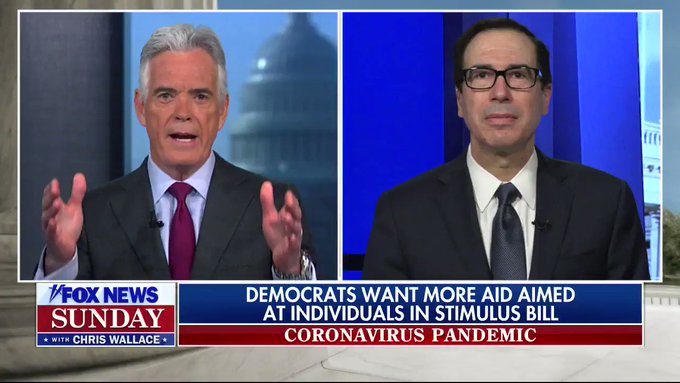The lockdown affecting 80 million people - nearly one in four of the American population - to try to curb the spread of the coronavirus is...
The lockdown affecting 80 million people - nearly one in four of the American population - to try to curb the spread of the coronavirus is likely to last 10 to 12 weeks, or until early June, US Treasury Secretary Steve Mnuchin has said.
Americans are adapting to the biggest change in daily life since World War Two with schools closed, sports canceled and economic upheaval as job losses mount with the shuttering of businesses across many industries.
Hospitals are scrambling for protective equipment for healthcare workers and ventilators as they brace for a wave of patients who will need help breathing. U.S. cases climbed to over 25,000 on Sunday morning and at least 325 people have died, with about half the cases in New York state, according to a Reuters tally.
The virus has killed over 13,000 globally and infected more than 300,000, prompting the likes of California, New York, Illinois and Texas to close non-essential business and ban large gatherings.
Asked how long state-wide stay at home orders could last, Mncuhin said on Fox News Sunday 'we're looking at a 10 to 12-week' scenario'.
41 people are talking about this
Lawmakers in Washington are nearing a deal that could pump a record $1 trillion into the economy to limit the economic damage from the coronavirus.
U.S. Treasury Secretary Steven Mnuchin told Fox News Sunday that he hopes Congress will vote on the bill on Monday. Proposed payments to an average family of four would be $3,000 and would only be one-time for now, he said.
Mnuchin also said the additional liquidity measures for the Federal Reserve aims to help a broad base of U.S. businesses get through next 90 to 120 days.
Questioned about the time it took the US to react to the virus, Mnuchin defended the government's actions.
'The intelligence community was giving the White House warnings back in January that the situation coming out of China was very, very serious and would likely end up in a pandemic,' guest host John Roberts said.
'Were you ever warned that something like this was coming down pipe because the initial White House reaction appeared to be, "Oh, don’t worry. It’s over there in China." I was told, why do we need to respond robustly because there’s only 16 cases here.
'Were you ever warned early on by the intelligence community that this was coming?'
'You know, I want to be careful talking about specific intelligence. But let me be clear — and this is not just in the U.S., this is around the world. Nobody expected this to take off at the rate it did.'
He added: 'The situation has changed very quickly and the president has responded to that.'
Time periods for atate-wide shutdowns are indefinite.
But Mnuchin shared lockdown plan details with Roberts when asked whether the time frame was more like six to eight weeks.
'Well first of all I hope that this gets passed soon as we need the money now,' Mnuchin began. ' I would say that we're looking at this anywhere from a 10 to 12-week scenario. But again, this situation is moving quickly.'
He added: 'We need to get the money into the economy now, if we do that we can stabilize the economy. We're putting a lot of money into the hospitals. I think the president has every expectation this is going to look a lot better four or eight weeks from now.'
Unless we tell people to stay home and to stop interacting in the way they were, we are going to see more and more, thousands more, tens of thousands of more deaths than we otherwise would,' Illinois Governor J.B. Pritzker told CNN on Sunday.
After two days of marathon closed-door negotiations, there was no sign of an overarching deal between negotiators late on Saturday, despite Republicans' claims of bipartisan agreement on specific issues including unemployment insurance and small business assistance.
'The past two days of intense bipartisan talks are very close to a resolution,' Senate Majority Leader Mitch McConnell said on Saturday. McConnell plans to hold a vote on the sprawling package on Monday.
Combined with actions undertaken by the U.S. Federal Reserve and the administration, the prospective bill would have a $2 trillion net impact on a U.S. economy facing powerful headwinds spawned by the outbreak, according to White House officials.
Senate Minority leader Chuck Schumer, a Democrat who met twice on Saturday with Mnuchin, agreed progress was being made.
'I'm optimistic we can get a deal,' the New York Democrat told reporters on Saturday.


No comments